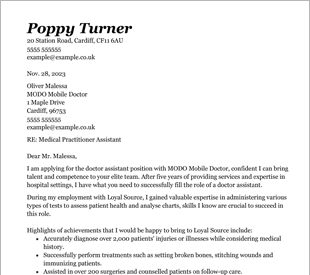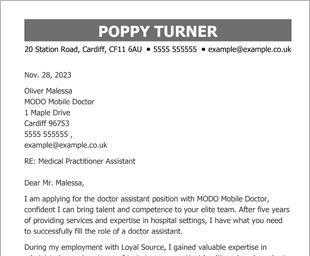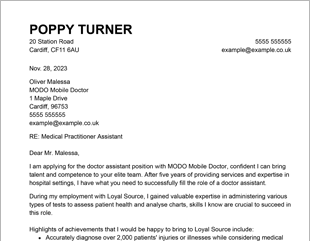What You Need to Know About Letters of Intent (LOI)
You may need a letter of intent if you have an agreement to work with a company in an initially undefined role. This guide will tell you what you need to know.
You may need a letter of intent if you have an agreement to work with a company in an initially undefined role. This guide will tell you what you need to know.





OUR USERS HAVE BEEN HIRED BY
Whether you are thinking of going into business with a colleague, you have been offered an unspecified role in a company or you have received a conditional offer from a university, a letter of intent can provide some peace of mind. This non-binding agreement is a useful way of formally setting out your intentions and obligations in an evolving situation where all parties are acting in good faith.
In basic terms, a letter of intent (or LOI) is a non-binding contract that acts as a basis for future proposed business, agreement or involvement. Though called a letter of intent, this non-formal contract can also be drafted as a document setting out proposed business transactions, responsibilities and obligations. Whatever form it takes, the effect of the document is the same.
This kind of document can be used to create a record of discussions as a matter of due diligence. It can also record the evolution of an agreement until a formal contract can be agreed upon and signed. It’s important to note that an LOI is not a final contract and it is not legally binding. This is a good faith agreement that acts as a memorandum of understanding.
A letter of intent might be created when:
These documents are particularly common in the construction industry so that contractors can begin procuring materials for real estate ventures until a more formal agreement is made.
As well as setting out the duties and responsibilities of each party, an LOI can also indicate where key points of a deal have to be clarified. As such, a letter of intent can act as a drafting board for a legally binding, contractual relationship.
Whatever format an LOI takes it should cover these basic issues:
Because a letter of intent is the precursor to a legally-binding contract, it is wise to take legal advice during the process. Contact a law firm to discuss the process and your part in it. While you can write a letter of intent yourself using a template, you will need a solicitor to draft a formal agreement.
Cover letter, letter of interest, letter of intent—these documents can sound quite similar if you are new to the job market, but there are some key differences. A cover letter is a supplementary document that is submitted with a CV as part of a job application. This should detail extra information about your skills and qualifications as a way to show that you are the right candidate for a job.
A letter of interest, in contrast, is a proactive introduction that you can send to a potential employer, even if they have no job openings. This document should be focussed on why you want to work for the company and the general value that you can bring. Because of its similar structure, this can be written using a cover letter template.
Finally, a letter of intent is, as stated, an informal but mutual agreement made in good faith without legal constraints. Though its name makes it sound similar to a letter of interest, it fulfills a very different and unique purpose.
Technically you do not need to respond to a letter of intent beyond signing or otherwise acknowledging your acceptance of the terms in some form. There is no legally prescribed form of acceptance. However, if the letter of intent is regarding an offer of employment or a place in an academic course, it is a good form to respond. You can do this by sending a short, professional acceptance letter signed with your full name.
A letter of intent may not be formal but it is a sign that an employer, university or third party is serious about the partnership or offer that they are making to you. If you are asked to agree to top terms set in a letter of intent, you should review them thoroughly before agreeing.
In strict terms, a letter of intent is not a formal, legal agreement. However, if the letter of intent was drafted between two individuals in a private financial matter, such as a loan, or there is evidence of bad faith on the part of one party, a court may treat it as an informal written contract and deem it enforceable. This is why it is important to take legal advice when drafting one.Â
We personalize your experience.
We use cookies in our website to ensure we give you the best experience, get to know our users and deliver better marketing. For this purpose, we may share the information collected with third parties. By clicking “Allow cookies” you give us your consent to use all cookies. If you prefer to manage your cookies click on the “Manage cookies” link below.